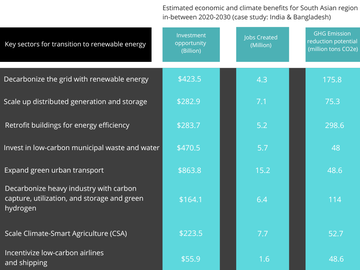Economies that are reliant on fossil fuels
“Let’s start by understanding what renewable energy is. Renewable Energy is obtained from naturally replenishing sources and is seen as sustainable and innocuous to the environment. As opposed to fossil fuels, which have limited reserves and contribute to environmental problems like climate change, renewable energy is derived from sources that do not diminish over time. MSMEs can profit economically from the use of renewable energy while also helping to create a cleaner future. These benefits include cost savings, energy independence, regulatory assistance, and improved brand recognition. MSMEs have a chance to advance their sustainability objectives, boost competitiveness, and contribute to a more resilient and sustainable business ecosystem by investing in renewable energy.
A case study of key sector energy transition in India and Bangladesh presents an overview of economic and climate benefits for the South Asian Region in-between 2020-2030."


(International Finance Corporation, 2021)
Likewise, renewable energy can support MSMEs working in various sectors. Something that comes to the top of my head – in the mountain communities in South Asia, the supply chain requires processes that are energy intensive, whether for powering agro-processing equipment or producing dairy products from milk, or improving the services offered by tourist lodges and homestays in the mountains (Saklani, et al., 2022). One key ingredient in the development of value chains is access to reliable, affordable, and sustainable energy.
Just think of how energy is crucial to the majority of the day-to-day operations of MSMEs and the cumulative consumption of energy has a sizable footprint in the environment. So, renewable energy can cater to the energy demands of MSMEs, and in doing so, they offset the use of fossil fuel alternatives.
Just for context, prudent investment in renewable energy will keep global warming below 2˚C, increase global GDP by 2.4 percent, and improve the overall well-being of people by 13.5 percent by 2050 as compared to the current trends of energy scenario (IRENA, 2020).”

Lalima pondered for a while.
“That’s true. It sounds obvious that MSMEs need energy for their day-to-day operations. My father’s business utilizes several machines that aid in the repair of water pumps. These machines run on electricity. Without reliable energy, my father won’t be able to provide repair services for pumps.
Similarly, if Kishor is to establish a chain of agrovets across South Asia, logistics and supplies of agri-related items will require a reliable transportation mechanism – just an example. The transportation network utilizes energy – be it from fossil fuels such as petrol or diesel, or electricity. Without energy, the transportation network wouldn’t function and impact Kishor’s operations of the agro vet chain. And I only talked about transportation, but other parts of his businesses that utilize various equipment will require energy to function.
Then there is Aabroo’s construction business which is more energy intensive. Construction service requires a lot of machinery, which again needs energy.
Baisali’s fisheries business also relies on energy for its operations. From commercial fishing to processing, packaging, and supplies; each step involves energy-reliant processes.”

Tashi nodded.
“Yes, but now extrapolate this energy use across the economy. Think of all the equipment such as diesel generators, vehicles running on diesel or petrol, etc. that is keeping the value chain of MSMEs functioning across an economy. Of the total energy supply, oil is the major energy source in Afghanistan, Maldives, and Sri Lanka; similarly, gas is the major energy source for Bangladesh and Pakistan; then coal is the major energy source for India; and only Bhutan and Nepal have renewable energy supply as a major energy source. All oil, gas, and coal are fossil fuel sources that are supporting 6 of the 8 countries in South Asia. (Data sources: IRENA Energy Profiles of each country, 2019[1])
You now know that the cumulative use of fossil fuels is significant, but then you also know that fossil fuel consumption is harmful to the environment. It has some severe impacts such as:
- Greenhouse gas emissions
- Climate change impacts
- Air pollution and health risks
- Premature mortality
- Environmental Degradation and Habitat Loss
- Ocean acidification
- Economic burden
The economies that are reliant on fossil fuels need to put in urgent efforts for the renewable energy transition.”

Lalima gazed into the distance.
“I’m convinced of that, but as you said, economies have been functioning with heavy reliance on fossil fuel energy with MSMEs being a significant part of it. So, what is the motivation to transition to renewable energy, and is the transition happening?”

“Aha! Now you came to the core of the discussion. There are multiple reasons why MSMEs should switch to renewable energy. First off, using renewable energy can result in significant long-term cost savings since it can lower operational costs by supplying a steady and predictable energy supply and reducing reliance on volatile fossil fuel prices. Second, it supports the international push for environmental sustainability and enables MSMEs to lessen their carbon footprint and aid in the fight against climate change. Thirdly, using renewable energy improves energy security and independence, decreasing reliance on grid reliability and guaranteeing continuous operations. Additionally, adopting renewable energy can provide MSMEs with a competitive edge, attract clients who care about the environment, and create new business prospects. Finally, the transition is made more financially feasible by the incentives and subsidies provided by organizations and governments, assisting MSMEs in accessing renewable energy technologies. Also, think about the investment opportunity and jobs created in the key sectors that I shared earlier. The data will speak for itself.”

Tashi leaned forward and again pulled out his smartphone to share some insights with Lalima.
[1] Obtain energy profiles of each country here
Average Rating: ☆ ☆ ☆ ☆ ☆ (0 reviews)

